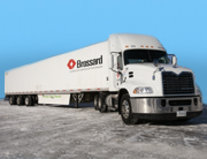A day with your Service Unit...
14 Tips to Avoid Problems This Winter!

Short story…
Brossard Leasing winter tips save a lot of problems
XYZ Distribution, on a very cold Monday of February, it’s minus 20, and all the company’s heavy vehicles are on the road without a problem this morning! Ever since the management team has decided to full service lease with Brossard, it was also decided to put all of Brossard’s winter suggestions in place and try to reduce problems.
Over are the mornings when a few trucks would not start, or that the air systems on a couple of them would be frozen and they would need to call a mobile service to get things going.
Winter is particularly tough on trucks and trailers and these simple tricks make all the difference. These instructions were explained to the team and a follow-up done by management.
Here are the tips to put in place for winter:
1. At the end of the workday, always drain the air tanks in order to reduce the risk of icing.
2. On a regular basis, add diesel fuel conditioner, especialy if you travel from South to North, inspect the interior of tanks to detect icing and don’t forget to inspect as well the reefer fuel tanks of the refrigerated trailers!
3. Connect the block heater of the vehicles at least 4 hours prior to starting the engine and above all, make sure that the outlets are in good working order. For maximum block heater performance, it is recommended to use extension cords with indicator lights that are no longer than 50 feet and are at least gauge 12.
4. Make sure that the Diesel Exhaust Fluid (DEF) tank remains full to avoid condensation and enhance an adequate flow of DEF to exhaust gas after treatment system. Do not reuse recipients as DEF can crystalize and cause problems.
5. Eliminate the number one enemy of new generation engines by avoiding idling as it promotes a large number of engine failures and increases your operating costs by unnecessary fuel use. Fast idling is also not recommended.
6. Remove snow from trailer roofs and truck boxes. Heavy snow can damage the roofs, and flying pieces of ice and of thick snow accumulations can cause severe road accidents and are in violation of the Highway Safety Code. Highway Safety Code. Remove the ice and snow accumulations from under the vehicles and that could lead to the rupture of the pneumatic lines. Click here
7. If you ever use an air brake antifreeze liquid, make sure its not pure methyl alcool, as this liquid attacks the integrity of the pneumatic system plastic tubing resulting in premature failures.
8. Whenever possible, park the vehicles in areas where they are protected from strong winds.
9. When starting a vehicle, make sure all switches are in the OFF position. This will reserve maximum electric power output to the starter.
10. At the end of the workday, make sure all switches, such as the inner box light switch, are in the OFF position.
11. Many vehicles, particularly class 7 units, are outfitted with pre-heating systems (glow plugs). When starting such vehicles, turn the key to the ON position and wait a minimum of 30 seconds before starting the engine. If there is such a system on your vehicle, a pilot light identified “Intake heater” will come on. Wait until this light goes off before starting the engine.
12. Never use ether to start these vehicles since this could produce an explosion in the engine air intake system and cause serious damages.
13. In cold weather, fully depress the clutch pedal when starting the engine so the starter will not have to power the transmission and will help start the engine.
14. Read and share these few suggestions with your team; they may help you keep your vehicles on the road and avoid additional repair costs.
Good success!
Other Articles That May Interest You
A Prestigious Platinum Award for Brossard Leasing
Brossard Leasing - 50th anniversary






